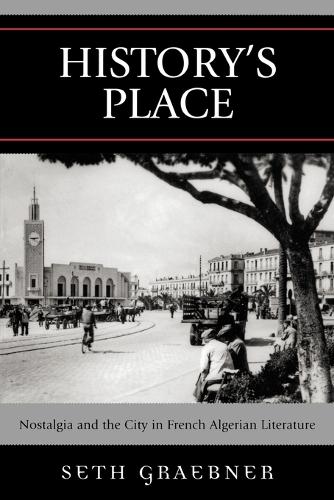
History's Place: Nostalgia and the City in French Algerian Literature
(Paperback)
Publishing Details
History's Place: Nostalgia and the City in French Algerian Literature
By (Author) Seth Graebner
Bloomsbury Publishing PLC
Lexington Books
25th May 2007
United States
Classifications
General
Non Fiction
848.91409
Physical Properties
Paperback
356
Width 156mm, Height 229mm, Spine 23mm
567g
Description
History's Place explores nostalgia as one of the defining aspects of the relationship between France and North Africa. Dr. Seth Graebner argues that France's most important colony developed a historical consciousness through literature, and that post-colonial writers revised it while retaining its dominant effect. The North African city became a privileged place in the relationship between literacy and historical discourses in the colony. Graebner analyzes the importance of architecture and urbanism as markers of historical development, as the urban fabric and descriptions of it became signs of difference between metropole and colony. Discussing writers as diverse as Bertrand, Randau, and Kateb, this book examines how the changing Algerian city has remained the locus of a debate colored by various sorts of nostalgia. Graebner demonstrates that nostalgia was symptomatic of historical anxiety generated by colonial conditions, but with literary consequences for mainland France as well. History's Place is a comprehensive and valuable addition to the study of French literature and cultural studies.
Reviews
History's Place is a distinguished, erudite, and convincing study of the crucial role of culture and literature in the articulation of the French-Algerian colonial relationship. Supported by outstanding research and innovative archival work, this book provides a compelling analysis of the ways by which three intellectual communities-Metropolitan French, Algerian French, and Arab/Imazighen-have continuously produced fictions of "Algeria" to support their claims to national identity and difference. Moving from the roman colonial to more recent postcolonial narratives, History's Place forces us to rethink our conceptions of French Algerian literature by insisting on trans-Mediterranean continuities rather than ruptures. As such, it is a wonderful tribute to the vitality and complexity of Francophone intellectual life since the nineteenth century. -- Lydie E. Moudileno, Associate Professor of French and Francophone Studies, University of Pennsylvania
Graebner's study is an innovative work, elaborated with a remarkable care for detail that still preserves the sense of an overarching structure of feeling and ideas that adhere to the movement of history. Not the least of its qualities is the clarity of its critical formulations, placed constantly at the service of an impressive breadth of coverage and analytical insight. * Research in African Literatures *
This is a timely and original project on Algerian writing that both illuminates and redefines its object of study. Graebner's interdisciplinary approach to storytelling crosses traditional ethnic, national, and religious boundaries. He successfully brings together the radically different voices of early Algerianists, Albert Camus, Emmanuel Robls, or Kateb Yacine and Rachid Boudjedra, without artificially reconciliing their points of view. -- Mireille Rosello, Universiteit van Amsterdam
Author Bio
Seth Graebner is Assistant Professor of French and of International and Area Studies at Washington University in Saint Louis.
